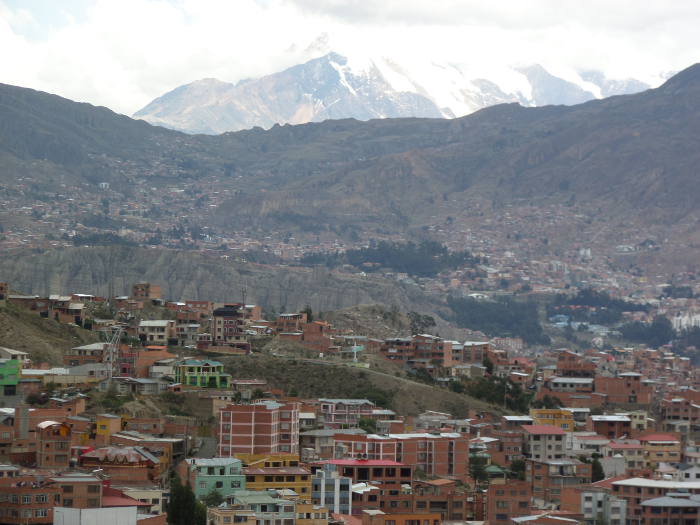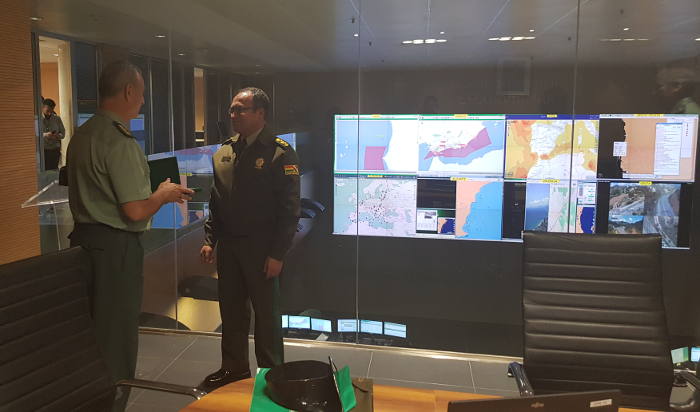-
|
28 October 2021
|Posteado en : Interview
Mario Farnós is a Guardia Civil lieutenant and the director of a project in Mauritania on maritime security. Next, we know his experience in the African country
What was your arrival in Mauritania like? Is there anything you remember in particular?
My arrival in Mauritania was calm at first since the coordinator (Alejandro Bosch) and I arrived together, and that calms you down a bit. For me it was the first long-term stay in Africa. You realise that Mauritania is a mixture of cultures, you know that it is an Islamic republic, as far as religion is concerned, but seeing how the Arab world and black Africa coexist was shocking for me.
As an interesting anecdote, eating with your hands is not easy…. seeing how they look at you, waiting to see if you eat the rice, or how you are going to cut a piece of meat. In the end they help you, they themselves cut it with their hand and give you the piece so you can eat, you can’t refuse such a gesture of kindness which, when you’re hungry, is very welcome.
How did the adaptation period go? What were the hardest and easiest things for you?
What I found hardest, professionally, was to take things with the relative simplicity and calm with which things are done here, they don’t plan over the short term, nor are they so strict with schedules or deadlines, but the day when something has to be done, they are there, they organise it from one day to the next, without any problem.
It reminds me a lot of how we used to do things in Spain 25 years ago, without so much protocol, procedure, and so on.
The least difficult thing for me was to see things from their point of view, I think I can empathise with people and I put myself in their place, I ask them for things knowing the means the country has available, the situation, the resources and the staff they have available, to know how far we can go together.
Is this your first experience outside of Spain?
Long-term, it is my first experience, I had already worked with FIIAPP as a short-term expert in Chile and Bolivia, but Islamic culture has nothing to do with Latin America.
Right now I am at the midpoint, I have been here a year and in principle I have another one to go, insallah! Although you never know how long we will be here, I am really happy.
What is your work like, your daily routine? Is it very different from the routine you had in Spain?
My day to day is completely different from what I did in Spain.
I worked as a post commander on the island of Fuerteventura and there your main function was to anticipate the arrival of immigrants, coordinate the security mechanism upon their arrival, anticipate they would awaiting medical assistance and transfer them to the hospital or to the Bureau of Immigration for their identification. Here it is very different, it’s working day to day with different institutions such as the National Gendarmerie, the Mauritanian Coast Guard, the Mauritanian Police and organising joint meetings so that they can work in a coordinated manner, not subordinate, in the field of maritime security and immigration , especially irregular immigration.
What is your relationship with FIIAPP like? And with your colleagues in Mauritania?
The relationship with FIIAPP staff, who are in Madrid, is different from how I had been working. Getting to know FIIAPP’s methodology, the processes, the procedures, understanding that everyone has their own patch…… but you realise that you can count on very capable professionals with extraordinary knowledge in fields I knew nothing about
With my colleague in Mauritania, Alejandro, what can I say? We arrived together, we shared the same office, we used just one computer and, as with colleagues from Madrid, you realise the great amount of knowledge and work capacity they have in areas you know nothing about.
How would you rate your experience of working as a FIIAPP expatriate?
In two words, very positive.
Professionally, it was a challenge for me, working in another country, in another language, another culture and, after a year, seeing that the Mauritanian beneficiaries are happy with your work makes you feel happy.
And on a personal level, it is a very rewarding experience that you will never forget.
Find out about the project that Mario Farnós coordinates in Mauritania.
2021″
-
|
06 September 2018
|Posteado en : Reportage
How do you fight against drug trafficking in a coca leaf producing country? We know the case of Bolivia together with the project to support institutions in this task
The United Nations Office on Drugs and Crime (UNODC) states in its report on coca leaf crops in Bolivia that the country has more than 20,000 legal hectares. An extension concentrated on two main areas: the area of the Yungas, in the Department of La Paz; and the area of Chapare, in the Tropic of Cochabamba.
The UNODC thus provides information to the Bolivian government on the amount and geographical location of the crops, since part of the coca leaf is diverted to illicit trafficking. The Bolivian Police and other institutions involved are trying to avoid this product becoming an international drug. This report allows them to develop strategies and policies for their control.
These institutions also have the support in this task of a project managed by the FIIAPP , in coordination with the National Council for the Fight against Illicit Drug Trafficking (CONALTID), with funds from the European Union and the AECID (Spanish International Development Cooperation Agency). And the paradox is even more difficult to tackle when the coca leaf is a cultural product.
The farmer is not the trafficker
Javier Navarro is one of the experts of the project. The Spanish National Police inspector recalls that “the consumption of coca leaf is something that is deeply rooted in their customs.” In Bolivia, the product is consumed directly with the acullico (chewing the coca leaf itself with other products that sweeten it) or is used for yerba mate or sweets.
Its production is managed through cooperatives. Each registered farmer has the right to grow one cato (1,600 square metres plot) of coca. The product would reach the legal market after going through the cooperative. The problem is that not all production follows that path.
Part of the coca leaf enters “parallel circuits” and with it the base paste from which cocaine hydrochloride comes out is made. Once this substance is obtained, we speak of trafficking itself, explains the police inspector. There are also illegal crops “in border areas or areas that are difficult to access”.

La Paz (Bolivia) None of the farmers, however, cooperate on this, they just live on it. “The producer does not have the profile of a trafficker,” says Navarro, and even if they acted unlawfully, they would be the smallest link in the entire drug trafficking chain.
Javier Navarro also points out that “Bolivia is not only a producer, but also a transit country”, mainly due to geographical issues. The base paste comes to the country from Peru, which is also a producer, to carry out the so-called “purification” in laboratories.
And he provides an important fact: “One kilo of cocaine hydrochloride costs 2,500 dollars in Bolivia. When it arrives in Spain, it costs 35,000 dollars.” Once again, Spain acts as a transit country: from here cocaine is exported to France, Italy or Great Britain with the resulting price increase. A journey that makes it a transnational problem.
What is the aim of the project?
To deal with this problem, members of the Civil Guard and the National Police work on this project with Bolivian officers in the fight against drug trafficking and related crimes, such as money laundering and human trafficking. Action is additionally taken at borders and airports.
In particular, the Special Force to Fight against Drug Trafficking is formed, specialised units spread over several areas of Bolivia. Drug trafficking is the dominant sector in organised crime. The changes in its methods of organisation and action require constant adaptation in the devices and strategies fighting this problem.
This training that has been complemented by visits to Spain to learn about the procedures of the Spanish security forces, for example, in intelligence and criminal investigation.

After two years of work, “the project is consolidated and it is the institutions themselves that come to it”, explains Javier Navarro. Among other things, the investigations have been addressed in a more comprehensive way. This is, according to the inspector, to not only stop the trafficker, but also to have the organisations dismantled.
This work is completed with the citizens’ awareness through some communication activities. The last of these, a workshop for journalists in which they worked on how to adequately communicate on such sensitive issues.
Projects for a transnational problem
Until recently, the FIIAPP managed a similar project in Peru , an example of good results with the dismantling of more than one hundred criminal organisations dedicated to illicit drug trafficking. The Foundation is also present in this operational dimension with the SEACOP project, for the fight against maritime drug trafficking.
There are also regional programmes to add to the public policies of Latin American countries. This is the case of EL PAcCTO against transnational organised crime or COPOLAD , which covers the social and health dimension.
Other projects follow the most important drug trafficking routes, such that of as heroin. EU-ACT operates in 30 countries in Central Asia, the East Coast of Africa and Eastern Europe, and works to improve the effectiveness of police and judicial bodies, as well as to prevent drug use.




